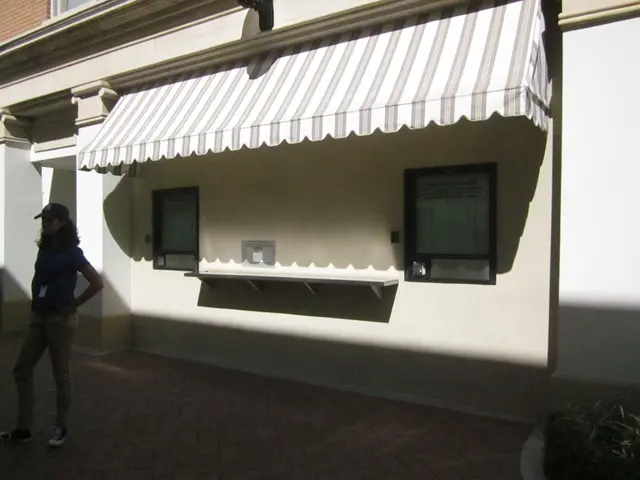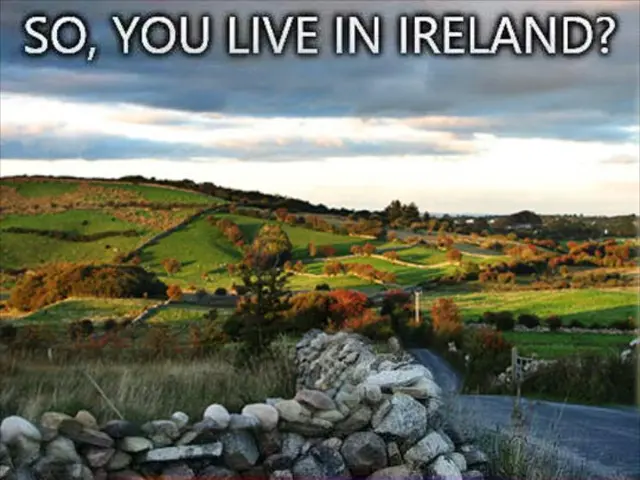Ties between Europe and the US faced strain
The Enduring Spirit of the Allied Victory
In the verdant hills and quaint villages of Belgium and France, the echoes of blood-stained boots and the shattering silence of war still resound, giving rise to tales of valor and sacrifice that resonate to this day. Marcel Schmetz, a wiry 91-year-old Belgian retiree, can still remember the chilling image of American trucks bearing the mutilated remains of his fellow countrymen, a haunting specter that sticks in his dreams even now.
The hushed remnants of war-worn soldiers haunt Schmetz, but they also instill in him an indelible sense of gratitude for the young American and international troops who had given their lives to end World War II. Such gratitude has spurred Schmetz to build a museum in his very home to honor the fallen heroes, a testament to the selflessness of those who were willing to die so that Europe could live.
"If it hadn't been for the Americans, we wouldn't be here," Schmetz declares, the sentiment echoed by countless other Europeans.
That same spirit is alive and well in Normandy, where the landing beaches on D-Day served as the starting point for an historic push against the Axis Powers that would reshape the world. Marie-Pascale Legrand, a selfless woman from Normandy, is still tending to the ailing Charles Shay, a 100-year-old American veteran who stormed the bloodied beaches as a teenager on that fateful day, June 6, 1944.
"Gratitude for me means that I am eternally indebted, because I can live free today," Legrand says.
This spirit of gratitude carried Europe through the remaining years of the war, as Allied forces pushed deep into German territory. It would take almost another year before Germany would finally surrender on May 8, 1945, bringing an end to half a decade of bloodshed, terror, and loss. Victory in Europe Day has become synonymous with the end of the war and the beginning of a new, hopeful era for the continent.
Frayed Bonds
For generations, the unbreakable bonds of gratitude between the nations on the Western side of the Iron Curtain and the United States were an enduring emblem of their shared history. But in recent months, the rhetoric from the White House has taken a turn, casting doubt on the very bond that bound Europe and America together for so long.
The Trump administration has raised questions about the longevity of the alliance and levied trade sanctions against the European Union (EU) and the United Kingdom. Trump has gone so far as to suggest that the EU was created to "screw" America from the outset. Europe and America now find themselves locked in a trade war, a harsh reminder of the fragility of their once-unshakable relationship.
"After all that has happened, it is bound to leave scars," observes Hendrik Vos, a European studies professor at Ghent University.
An Enduring Legacy
And yet, amid the tremors of geopolitics, the ties that bind the continent to America persist, frayed but unbroken. In the quiet towns and picturesque landscapes where the Battle of the Bulge was fought and Schmetz resides, and along the windswept cliffs of Legrand's Normandy, the bonds remain strong, a testament to the sacrifices made by the Allied troops during the war.
"For all the criticism directed at the Americans, we can only say that for us, they were all good," Schmetz asserts. "We should never forget that."
Schmetz watched in horror as the corpses of soldiers arrived at the nearby Henri-Chapelle cemetery when he was just an 11-year-old boy. What he saw that day forever touched him, and after his retirement, he vowed to do something in their honor. He transformed his large workshop into the "Remember Museum 39-45," amassing an incredible collection of military relics that continue to resonate with visitors today.
A comfortable bench in the kitchen serves as a gathering place for American veterans and their kin, where they gather to recall the events of the war, share their stories, and reaffirm their connection to the continent they helped save. Schmetz's beloved wife, Mathilde, carefully preserves the stories for future generations, ensuring that the memories of the past live on in the hearts and minds of those who follow.
Shay, who served in the 1st Infantry Division, has been a frequent visitor to the D-Day beaches for over two decades. In 2018, following a decline in health, he moved in with Legrand, who has been caring for him with unwavering devotion.
Remembrance in Normandy
For Legrand, it was the words of then-US President Ronald Reagan that sparked her desire to honor the sacrifices made by American soldiers. In 1984, at the age of just 24, Legrand listened as Reagan spoke of the heroism of American troops on the windswept cliffs of Normandy, ensuring that their blood would forever be part of the soil of Europe.
Before meeting Shay, Legrand had been volunteering to aid Allied veterans for years. As Shay grew frail and lonely, Legrand took him into her home, devoting her life to caring for the dying veteran and carrying on the spirit of gratitude forged in the fires of war.
"It is a strong symbol, which takes on a new dimension in this day and age," Legrand says, referring to the strained transatlantic relations that have put the bonds that Trump once called "unbreakable" under immense pressure.
Central to Trump's criticism of European NATO allies is the belief that they have been enjoying the protection offered by American military supremacy for far too long, and that they must start to shoulder more of the burden themselves. The rhetoric has sparked genuine fears among Europeans that the end of the transatlantic bond that defined global politics for nearly a century may be nigh.
"The naive belief that the Americans will, by definition, always be an ally - once and for all, that is gone," Vos laments. It raises an uncomfortable question for Europeans: "Are we doomed to be eternally grateful?"
As the 80th anniversary of the Battle of the Bulge approaches, local communities will once again come together to commemorate the sacrifices made by American troops, underscoring the dichotomy between political strains and the enduring reverence for those who gave their lives for Europe's freedom.
Enrichment Data:
- The Battle of the Bulge: American forces played a crucial role in the battle, resisting a major German offensive in the Ardennes region. The battle resulted in significant casualties, but ultimately secured Belgium’s liberation and cemented goodwill among local populations[1][3].
- Operation Cobra and the Falaise Pocket: American forces played a pivotal role in Operation Cobra, which broke through German defenses in Normandy. The subsequent encirclement of German forces in the Falaise Pocket led to the liberation of Paris and crippled Germany’s Army Group B[5]. The French Resistance also collaborated closely with American forces during both operations[4].
- Liberation of France: American forces, working alongside the French Resistance, pushed deep into German territory following the successful operations in Normandy, ultimately resulting in the liberation of Paris and the crushing of Germany’s Army Group B[5].
- Postwar relations: NATO and shared democratic values strengthened ties between the United States and European countries after World War II. However, the Trump administration has raised questions about the future of the alliance and has imposed trade sanctions on the EU and UK[1].
- In the aftermath of the Battle of the Bulge, a vulnerable 11-year-old Marcel Schmetz witnessed the arrival of corpses of soldiers at the nearby Henri-Chapelle cemetery, an experience that left an indelible mark on him.
- Amid the contemporary discord in politics, Schmetz's "Remember Museum 39-45" in Belgium continues to Stand as a symbol of gratitude and remembrance, serving as a gathering place for American veterans and their kin.
- In Normandy, Marie-Pascale Legrand's devotion to Charles Shay, a 100-year-old American veteran, reflects the deep-rooted bond still felt by many Europeans towards the Allied troops who fought in war-and-conflicts, particularly during the D-Day landings.
- As the 80th anniversary of the Battle of the Bulge approaches, central to the commemoration will be the dichotomy between the ongoing political strains and the enduring remembrance for the American soldiers who gave their lives for Europe's freedom, while simultaneously questioning the future of the policy-and-legislation that has defined transatlantic relations for nearly a century.







